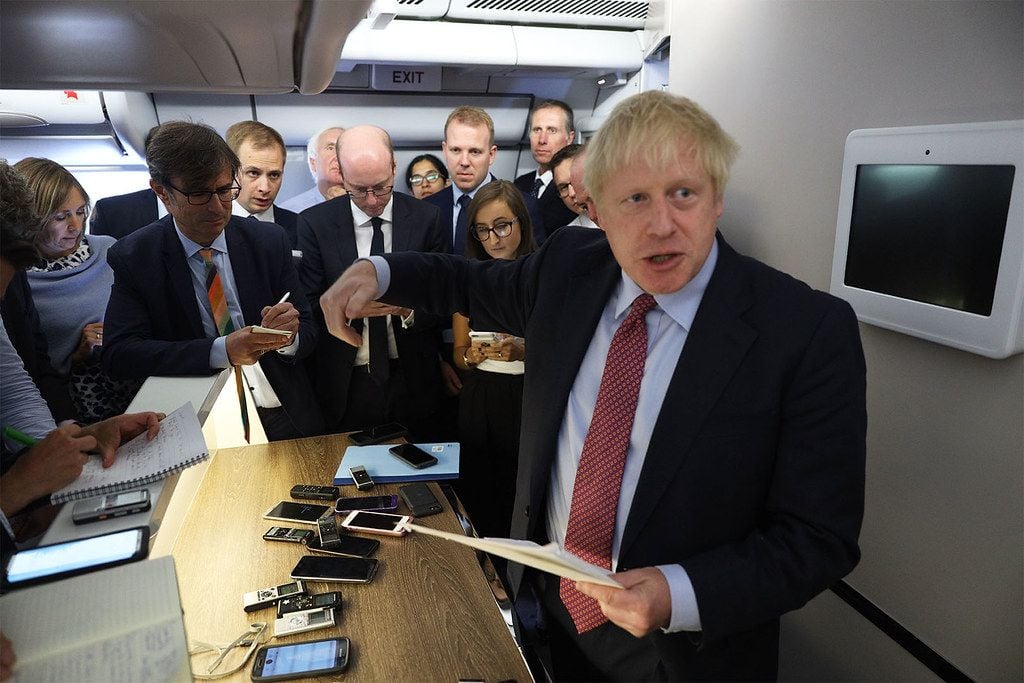Sterling 'Fretting' over Mixed Messages on Brexit Delay
- Written by: Gary Howes

Above: Boris Johnson. File image © Gov.uk
- Pound-to-Euro exchange rate: 1.1197, down 0.40%
- Pound-to-Dollar exchange rate: 1.2295, down 0.37%
- Govt. legal papers suggest UK will ask for Brexit extension
- But Downing St. sources say UK still leaving the UK on Oct. 31 if no Brexit deal agreed.
The British Pound went lower against the Euro, Dollar and other major currencies on Friday, October 04 amidst mixed messages over whether or not Prime Minister Boris Johnson would in fact ask for a Brexit extension if he fails to strike a deal with the EU before the October 31 deadline.
According to government papers submitted to a Scottish court, Johnson will send a letter to the European Union asking for a Brexit delay if no divorce deal has been agreed by October 19,
The revelation came as anti-Brexit campaigners pursued legal action in Scottish courts aimed at compelling Johnson to comply with the Benn Act, or have judges write to the EU on his behalf asking for the extension.
The Benn Act is a piece of legislation passed by Parliament in September that legally obliges Johnson to request a Brexit extension of the EU if Parliament has neither voted for a deal or a 'no deal' Brexit by October 19.
The legal challenge also says if Johnson fails to comply, the courts should impose penalties "including fine and imprisonment".
In submissions to the Scottish court, the Government said that Johnson accepted that he was obliged to send a letter to the EU asking for a delay and that if an extension was granted, the UK would also agree to it.
The developments are significant in that Johnson has repeatedly said the UK would be leaving the EU on October 31. From a foreign exchange perspective, the developments should on the face of it offer further support to Sterling as the prospect of a 'no deal' exit in 2019 will have dropped yet further.
Sterling has tended to move higher or lower in response to falling or rising odds of a 'no deal' exit. Thus, on the back of the news, we would expect the UK currency to remain well supported over coming days and weeks.
However, ahead of the weekend the British Pound is actually trading in the red and we suspect markets find little new in these developments as Johnson has previously promised he will abide by that law, yet at the same time he has also vowed that he would not ask for any delay and that the UK will leave the EU, "do or die".
He has yet to explain the apparent contradiction.
Indeed, Steve Baker, the Conservative MP who heads up the party's Eurosceptic European Research Group responded to the developments saying: "a source confirms all this means is that Government will obey the law. It does not mean we will extend. It does not mean we will stay in the EU beyond Oct 31. We will leave."
Neil Wilson, Chief Market Analyst at Markets.com says the Pound is fretting about the UK’s exit from the EU, resulting in heightened volatility in the currency:
"The news out today is a cacophony of mixed messages – on the one hand the government says it will comply with the Benn bill but on the other it will still seek to leave on Oct 31st without a deal if one is not agreed. The EU has all but rejected the deal on the table. Pricing for this has become a nightmare for traders – expect more volatility. Many may feel it safer to stay on the side lines.”
BBC Political Editor Laura Kuenssberg meanwhile says a senior No 10 source told her they can avoid delay, the source telling her: "the government will comply with the Benn Act, which only imposes a very specific narrow duty concerning Parliament’s letter requesting a delay".
The source adds the Benn Act is drafted by an unknown subset of MPs and pro-EU campaigners which can be interpreted in different ways, "but the govt is not prevented by Act from doing other things that cause no delay including other communications, private and public."
It therefore remains as uncertain as ever as to how the Prime Minister will proceed, and we expect currency traders to continue displaying caution towards Sterling as a result.
"Although PM Johnson’s tone has become more conciliatory recently, this could simply be a tactic to blame the EU if talks break down. The Pound’s current level seems difficult to justify under these circumstances and so we expect it could go lower," says Derek Halpenny, a foreign exchange analyst with MUFG in London.
Time to move your money? Get 3-5% more currency than your bank would offer by using the services of a specialist foreign exchange specialist. A payments provider can deliver you an exchange rate closer to the real market rate than your bank would, thereby saving you substantial quantities of currency. Find out more here.
* Advertisement




